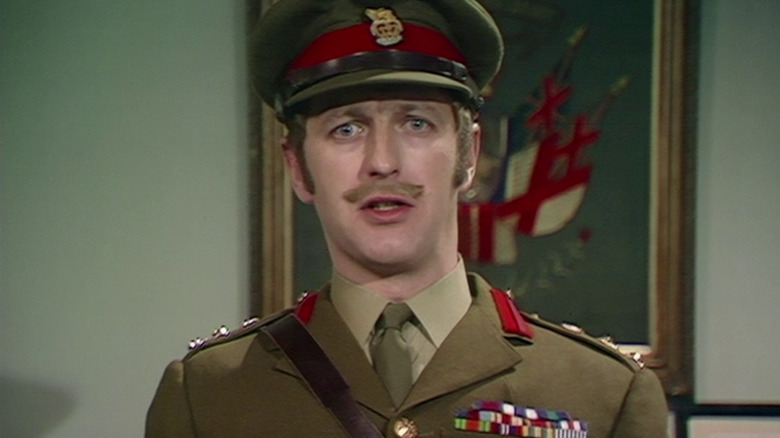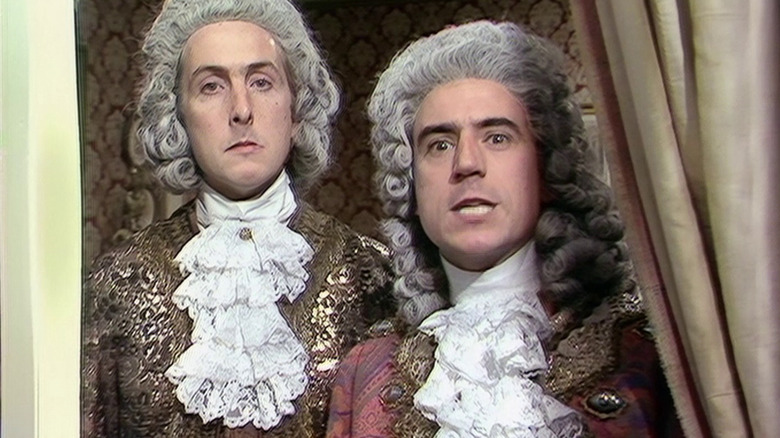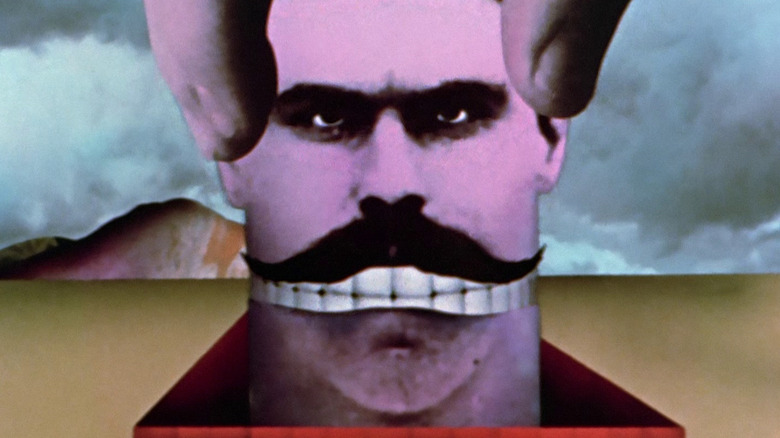Monty Python Sued ABC For A Good Reason
"Monty Python's Flying Circus" was a tough sell in the United States, and it's easy to see why. Many of the TV shows and media tropes that the Pythons lampooned on their famously absurd sketch comedy show were unbearably insular to British audiences. There were jokes about local television personalities, spoofs of English news programs, and send-ups of the BBC's tendency to cram dry, not-at-all-entertaining documentaries into their programming blocks. (Even years later, core Python John Cleese admitted to having "no idea" why the property continues to resonate in the U.S.)
The BBC had made a deal with Time-Life Television to broadcast reruns of "Monty Python's Flying Circus" in the United States, but after a deal had been struck, Time-Life deemed the series to be "too British" for U.S. audiences. Ultimately, it was shelved. Time-Life's suspicions about the Pythons were proven true when the troupe's 1971 anthology film "And Now for Something Completely Different" tanked at the box office. Additionally, the six silly men performed a 30-minute block of material on a 1973 episode of "The Tonight Show" and it went over like a lead balloon.
"Flying Circus" didn't seem to find its audience stateside until a PBS station in Dallas, Texas — KERA — started airing episodes in their entirety. Once PBS' audiences (at least the weird ones) finally had a chance to see "Flying Circus" unadulterated, they immediately fell in love. Other PBS stations around the country also began airing it, and the show finally started to catch on. Then, in 1975, the Pythons' first movie, "Monty Python and the Holy Grail," opened in theaters to reasonable acclaim, drawing even more Americans into the web of PBS' Python broadcasts.
And then the networks got involved. ABC picked up "Flying Circus" for mainstream, nationwide broadcast in 1975. Baffled by the show, however, and concerned by some, uh, naughty bits, ABC (in its finite wisdom) decided to take the few episodes it had bought and slice them up into a 90-minute anthology special.
The Pythons didn't like that. No, no. Not at all. Indeed, the New York Times reported in 1975 that Monty Python took ABC to court, insisting that their shows be restored.
They won.
ABC edited Monty Python's Flying Circus for time and content ... and got sued for it
When ABC got its grubby little mitts on "Flying Circus," it clearly didn't know what to make of the show. More than anything, though, it was concerned about some of the series' raunchier elements; "Flying Circus" features a small amount of nudity (which was not permitted on U.S. TV), and it could afford to be a little edgier, making toilet jokes more openly. It's also worth noting that U.S. TV shows in the mid-'70s required multiple ad breaks, while British shows could run a little longer. Time was a legit concern. How would ABC fit 30 minutes of filmed material into a 26-minute spot?
A memo about "Flying Circus" was circulated throughout ABC, and the good people at the New Yorker uncovered it.
The notorious memo, also talked about in Mental Floss, noted that ABC was skittish about some very specific things. Its deal was for six episodes, and, judging by its fears, they appeared to be all six episodes of the show's fourth season from 1974: "The Golden Age of Ballooning," "Michael Ellis," "The Light Entertainment War," "Hamlet," "Mr. Neutron," and "Party Political Broadcast." When the first three of those episodes aired as a truncated, specially-edited 90-minute special on October 3, 1975, it went out with a full 22 minutes of material excised. It seemed ABC didn't like the idea of a flattened dead cat being used as a doorbell, nor was it keen on explicit references to colonic irrigation. ABC also cut out some cuss words like "damn" and "Good Lord."
When the Pythons caught wind of ABC chopping up three of their episodes, they were incensed. They wrote their shows to flow in a certain way, and objected strenuously to both the interruption of that flow and to the brazen censorship. While ABC was gearing to air a second 90-minute special, scheduled for that December, it intended to similarly slice the material to ribbons. To prevent the second special from going live, however, the Pythons took ABC to court.
The Pythons didn't want money
The lawsuit wasn't to get any financial restitution, however. The Pythons just wanted their show to retain its artistic integrity. Only Terry Gilliam, the sole American of the bunch, and Michael Palin appeared in court in person to object to what ABC was doing. The judge in the case, Morris E. Lasker, had to make a judgement based on a loss of artistic control over an imported TV show, something that isn't argued in court a lot. Indeed, ABC was legally allowed to edit the show however it wanted, so it wasn't even a legal matter. It was, to repeat, all about integrity. The judge admitted, and this is hilarious, that ABC robbed the troupe of their "iconoclastic verve."
ABC eventually aired a truncated version as it intended, but a court injunction demanded it be broadcasted with an on-screen disclaimer that it had been edited for TV. After it aired, however, the Pythons appealed their case and actually won. They prevented ABC from ever airing the truncated specials ever again. The judged banged his little gavel and "Flying Circus," from then on, had to be aired uncut.
The courtroom win, it turns out, was also a legal coup. Thanks to some byzantine details in the contracts between the BBC and ABC, it was revealed that the copyright for "Monty Python's Flying Circus" would be released in the year 1980. The ABC case allowed "Flying Circus" to revert into the hands of the Pythons themselves, giving them control of the entire show. It finally belonged to them.


